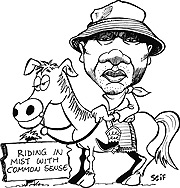The recent escape of the former senater Stanley Safari raised dust in Rwanda. Many people complained that such a high level suspect should not have been given chance to escape the arm of the law. Tumba (Huye district) court found him guilty of genocide, complicity in genocide and sentenced him to life imprisonment.


The recent escape of the former senater Stanley Safari raised dust in Rwanda. Many people complained that such a high level suspect should not have been given chance to escape the arm of the law. Tumba (Huye district) court found him guilty of genocide, complicity in genocide and sentenced him to life imprisonment.
But all these were done in his absentia. Safari had fled the country because he anticipated such a verdict. He is not the only one. Former speaker of parliament, Alfred Mukezanfura also managed to sneak out and seek asylum.
The Rwandan law (which Gacaca courts adhere to) has it that one is innocent until proved guilty by the courts of law. That is why I see Gacaca courts being in a fix.
What should be the way forward? Gacaca courts and other courts in Rwanda, should request that suspects be kept in custody while their cases are being worked on.
I completely disagree with this principle of people being free yet they cases involve crimes against humanity. We need legislature that will provide for genocide crimes.
When suspects are left scot free, it gives them room to flee and this is both disastrous and heart breaking. It is time for change.
I say this because if we continue to give these suspects time to escape, we shall be sending a very bad message to other suspects.
I personally feel that separate provisions of law should be in place, to tackle those who were responsible for the 1994 genocide against the Tutsi.
Much as I do not advocate for tit for a tat, people who committed atrocious acts against humanity should not enjoy ‘fair judicial principles’.
It is high time we designed a law where genocide suspects are held in custody until they are cleared and proved innocent or convicted.
If Gacaca courts had the opportunity to be guided by such a law, I am certain that the likes of Safari wouldn’t have escaped.
I do not of course expect to ‘pull muscles’ with anybody, since innocent until proved guilty, only applies in the court of law. The court of ‘public opinion’ applies otherwise.
Neither do I intend to take the advantage of public sympathy, to call for the impossible. We need to draw a dichotomy to arrive at a lesser evil-special principle for genocide suspects.
People should understand that even if suspects are held in custody, it that does not mean that they are guilty. It is just guarantee that suspects would not flee the country while their cases are still in the courts.




